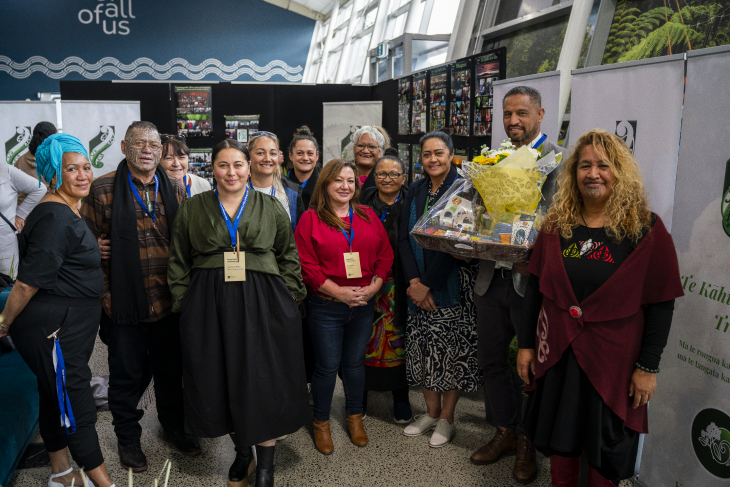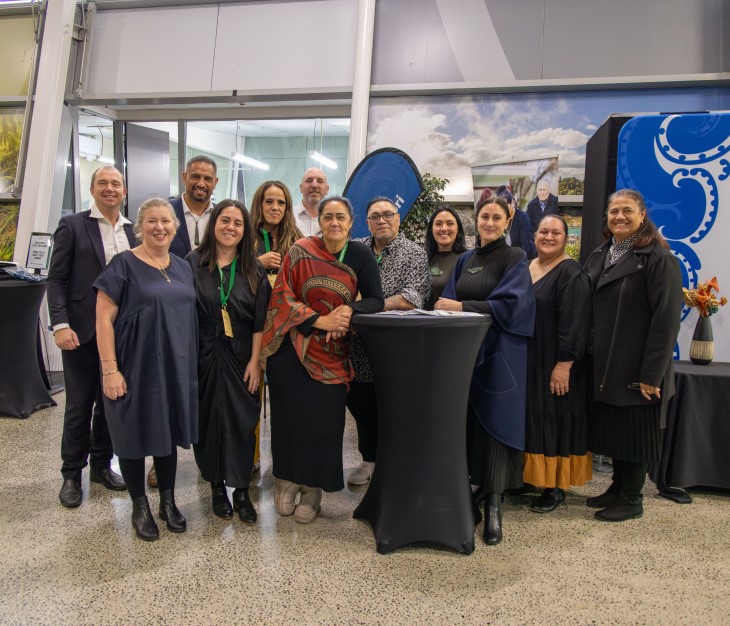Conference leaves legacy for rongoā Māori to flourish
The inaugural ACC Rongoā Māori Conference provided a unique opportunity for practitioners and other health professionals to collaborate and share learnings, pointing the way for traditional Māori healing to continue to flourish across the motu.
Many more New Zealanders are set to benefit from rongoā Māori over the coming years, following a historic and hugely successful hui in Rotorua.
The first ever ACC Rongoā Māori Conference was proudly hosted on the whenua of Ngāti Whakaue and brought together more than 400 participants, including rongoā practitioners, clinicians, researchers and other health professionals from all over the country, with some even travelling from overseas.
It was a chance to whakawhanaunga (build relationships) and grow understanding of traditional Māori healing and its place in Aotearoa New Zealand’s health sector. The wider aim was to share knowledge for the benefit of kiritaki (clients) who engage with rongoā services.
“We set out to provide space for our rongoā community from across the motu to come together and join with health practitioners, to learn and understand rongoā and its place in the health sector,” says Eldon Paea, Head of Māori Health Partnerships for ACC.
“I’m proud to say we achieved that – connections were made and so many learnings were gained. The insights shared by all the wonderful speakers, and in the kōrero between attendees, was inspiring.
“The kotahitanga, whanaungatanga and wairua of the conference was just what we’d hoped for, with everyone there excited to connect with others, and to share and learn about this taonga.”
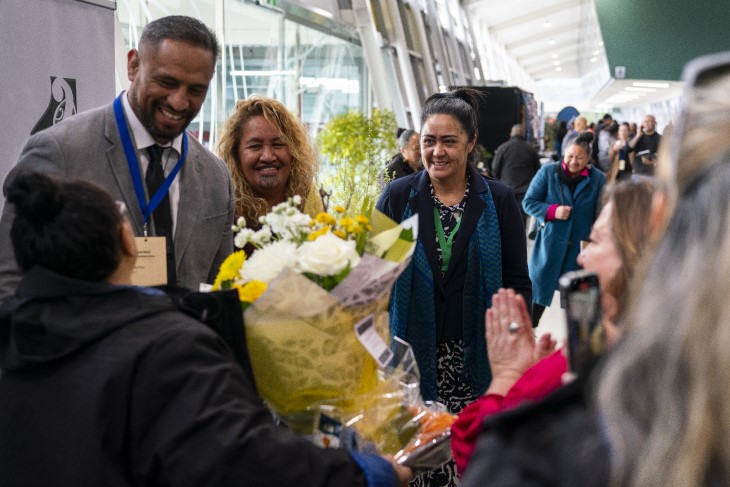
Head of Māori Health Partnerships Eldon Paea, Rongoā Māori Advisory Panel member Awhitia Mihaere and Māori Health Lead Pollyanne Taare.
Positive impact on the health sector
Eldon says the Māori Health Partnerships team at ACC has received a wealth of positive feedback, highlighting the impact the conference had on those in attendance.
“We’ve heard from the rongoā community about how uplifting the conference was and how they felt during the two days,” he says.
“They were welcomed into a space to connect with others and discuss the challenges and opportunities that exist for rongoā Māori.”
It wasn’t just rongoā practitioners who found the experience invaluable. Eldon says those from other parts of the health sector have also indicated they were able to take much from the conference.
“We’ve had feedback from sector professionals about how eye opening this conference was for them, and how excited they are to start applying their learnings in their health spaces,” he says.
“This was our goal, to help raise understanding of rongoā and encourage collaboration for the benefit of our kiritaki and whānau.”
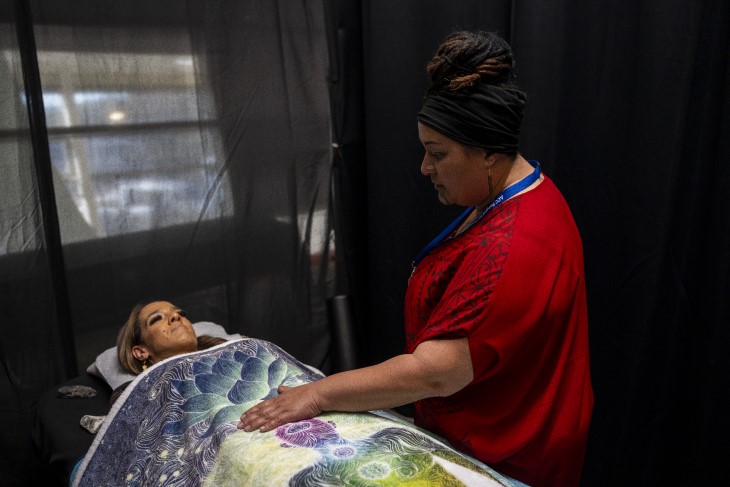
Rongoā Māori practitioner Lyn Creighton delivering a rongoā session during the conference.
Keeping kiritaki at the heart
While the conference was delivered to practitioners and other health professionals, Eldon says the focus was very much on kiritaki and how rongoā can help achieve positive health outcomes for whānau.
“This was an opportunity to reinforce our commitment to our kiritaki, by creating this space for our practitioners, researchers and health sector professionals to connect, learn and explore opportunities for collaboration.”
ACC delivered the ground-breaking Rongoā Māori Conference in partnership with Te Aka Whai Ora (Māori Health Authority) and Te Puni Kōkiri, principal policy advisor of the New Zealand Government on Māori wellbeing and development.
“We’re proud to have had their support for this conference and I’d like to thank everyone involved for the huge amount of mahi they put in to make it such a success,” Eldon says.
“The aroha that went into delivering this conference was amplified by all those who attended.”
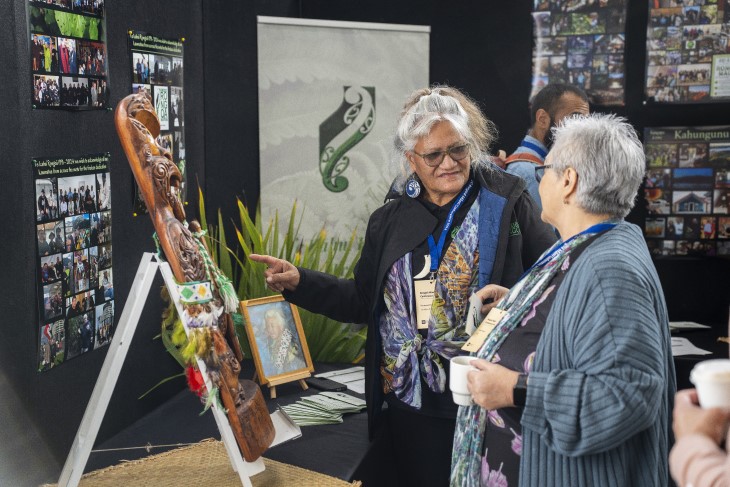
The inaugural Rongoā Māori Conference conference included stalls and exhibitions.
Moving moment after months of mahi
Many of the participants have worked in rongoā Māori for decades and were deeply moved by the opportunity to come together and celebrate traditional healing.
“When it came up on the screen saying ‘ACC Rongoā Māori Conference 2024’, that’s when it really hit home,” says Pollyanne Taare, Māori Health Lead for ACC.
“It’s been 18 months of thinking and planning, and wanting so desperately to do the right thing, and to get it right. To get to this point is a milestone, both for rongoā and for Māori health at ACC.
“To support bringing so many people under the one roof for the love of this particular kaupapa is a privilege and an honour. Rongoā calls everybody, so having everyone together – who are all there for the right reasons and for the love of rongoā – was amazing.”
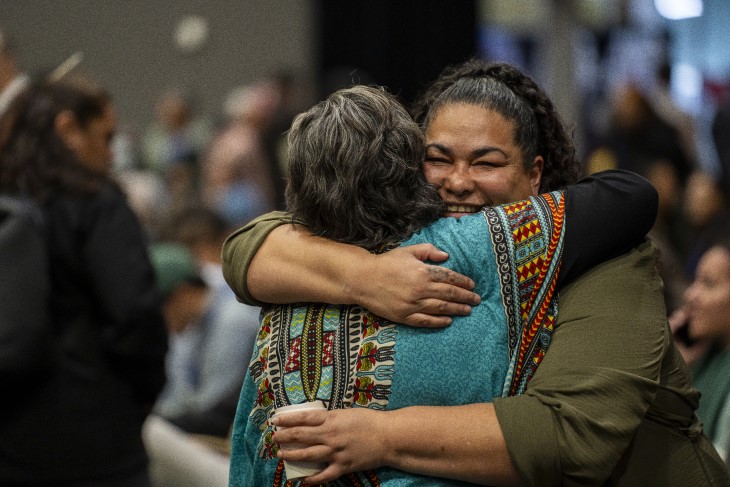
Rongoā Māori practitioner Teresa Hart embraces a friend at the conference.
‘We’ve come a long way’
Donna Kerridge, a member of the ACC Rongoā Māori Advisory Panel, also found the conference an emotional experience.
“I remember when we first started, it was just a handful of people inside ACC trying to educate people as to why rongoā Māori is so important to helping the kiritaki that ACC serve,” she recalls.
“So to see this now warms my heart, I just wanted to hug and kiss everyone who came in the door because we don’t often get a chance to gather like ACC has provided here.
“For us to be together, to talk about the challenges, to celebrate the successes – it’s beyond words for me to describe how far we’ve come in such a short space of time.”
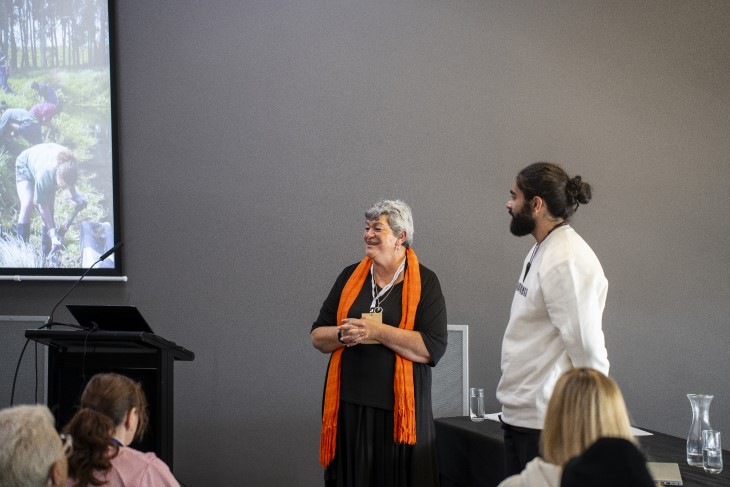
Rongoā Māori Advisory Panel member Donna Kerridge giving a presentation.
‘Our tūpuna will guide us’
Hazel Scandlyn, Principal Advisor Mātauranga Māori, was a driving force in ACC making rongoā Māori available to all New Zealanders as a rehabilitation option.
This vision became a reality in 2020 and rongoā has now helped over 10,000 ACC kiritaki across the country.
“The dream was for everyone to be able to access rongoā Māori – the problem was we didn’t have an avenue for being able to do that and we didn’t know whether people would utilise the service,” Hazel explains.
ACC data shows 59 per cent of kiritaki accessing rongoā are Māori, while 41 per cent are non-Māori.
“When we first started, we weren’t sure how it was going to go. We had a lot of people watching – all of our tūpuna, iwi, hapū and whānau – and we knew it was a taonga for Māori. So to bring that into a Crown space was a bit of a scary thought,” Hazel says.
“To be here now, having grown the service and delivered this conference, is a proud moment. It shows that, as long as we wear our korowai and we move with tikanga and kawa, we’ll be safe – our tūpuna will guide us.”
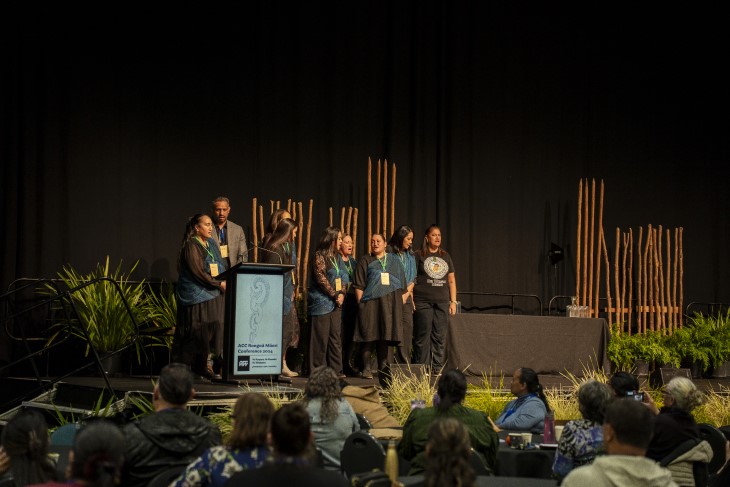
Principal Advisor Mātauranga Māori Hazel Scandlyn, far right, on stage at the conference.
Accessing the rongoā Māori service
If you have a covered injury, you can find out more about accessing the rongoā Māori service on our website.




